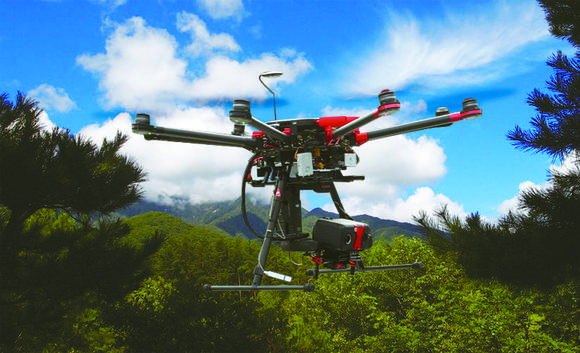The sky’s the limit: New drone-focused instructional program to be offered in fall 2019
August 2, 2019
This fall, eight UNC faculty members will participate in a five-day intensive course that will explore the operation, safety, federal regulations and data collection capabilities of drones for environmental research.
Susan Cohen, associate director for UNC’s Institute for the Environment (IE), and Geoffrey Bell, teaching associate professor for UNC’s Environment, Ecology and Energy Program (E3P), will lead this workshop. Funding is provided by the Center for Faculty Excellence (CFE)/Lenovo Instructional Innovation Grants Program, which supports initiatives that explore creative ways to integrate modern technology into the learning environment.
This workshop will provide both in-class and hands-on instruction covering drone operation, safety, regulations set by the Federal Aviation Administration (FAA), mission planning, weather, air space and geospatial data analysis. Each day will be divided between in-classroom lectures and active learning by means of hands-on flight activities to bolster the participants’ drone confidence.
“We want people to take the class and then feel empowered to go use drones,” says Cohen.
Understanding the wariness expressed by many toward drones, Cohen and Bell are hopeful that this course will help break this stigma and highlight the value of drone use in environmental research. By emphasizing mission planning and safety regulations in addition to learning to fly the drones, the primary goal of this workshop is to spur drone innovation at UNC. Cohen and Bell anticipate that teaching responsible and effective drone use will inspire participating faculty members to incorporate drones into their own courses and research projects.
“If they leave that class with the confidence to start collecting data [with drones] that they don’t have the opportunity to collect otherwise, then it’s been successful,” Cohen explains. “And if they share this technology with students, then that’s a win, too.”
The course will be conducted at the Horace Williams Airport, where the eight faculty participants will receive in-classroom instruction as well as an open area in which to practice the basics of flying. For the first four days of the intensive, instruction will be centered around creating a series of online learning modules that will provide lessons on research-focused drone use for years to come. The final day will consist of a practicum in which the participants will carry out their own data collection using drones for a research project of their choosing.
UNC has never before offered a program dedicated to teaching the basics of drone use for environmental research. Cohen and Bell both recognize how much of an asset drones can be when conducting any form of research.
“It is just apparent that [drones] are a solution to a lot of data collection challenges, and they are a cheaper and safer way to do a lot of work,” says Cohen. “There are some limitations, but there are many instances where you can get all the information you need for a lot less money and that don’t require putting someone up in a plane.”
Among the long-term goals of this program is to make this course available for future student enrollment, as well as to eventually develop a drone center at UNC that will provide the resources, instruction, and inspiration for students to incorporate drones into their own research projects that extend far beyond environment-related topics.
Story by Dylan Morgan ’22
Dylan Morgan is an environmental science major at UNC and is part of the graduating class of 2022. This summer, he is working as a communications intern at the UNC Institute for the Environment. Morgan’s career aspirations combine environmental research with journalistic storytelling, particularly in the fields of ecological restoration and natural resource conservation.
